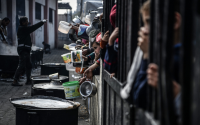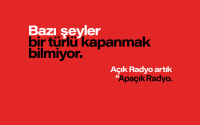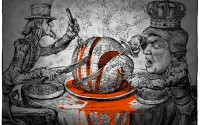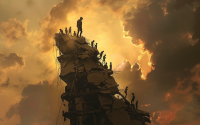15 July 2005The Guardian
One American expression has no equivalent in British English. "Is this a great country or what?" Americans will say to themselves, sometimes ironically, but usually as an expression of open-faced wonder and gratitude at the splendour of their native land.
We Brits don't really go in for that. We knock ourselves, we knock the places we live in: this is the country that snaps up a book called Crap Towns. So last night in Trafalgar Square was a novel experience. A huge crowd, standing in their thousands in blinding sunshine, to be told again and again that they live in one of the greatest cities in the world.
Led by the mayor, Ken Livingstone, writers, politicians and faith leaders competed with each other to lavish praise on London.It was the culmination of a day of remembering in which Londoners had stood together - most obviously during a two-minute silence on the stoke of noon.
There were little ceremonies all across the capital and on each of the sites of last week's explosions: moments of what Mr Livingstone had called "healing but not forgetting".
Sebastian Coe stood on the steps of the National Gallery, a human reminder of the last time Trafalgar Square had been packed out.
It was just eight days ago - when word came that the world had paid London the grandest possible compliment, choosing it to host the Olympic games of 2012 - but it seemed to belong to a different age.
Lord Coe told the crowd he had bragged to the Singapore judges of London's creativity, diversity and tolerance. "They weren't just warm words to get us through an election," he said. Their truth had been proved the very next day, in a way that no one had ever predicted.
Sir Trevor McDonald brought a surge of applause when he told of his childhood in the West Indies, looking longingly at London as "the great, distant metropolis". Now, "I'm proud to declare myself a Londoner". As he spoke, the waters of the fountains glittered; the sunlight dazzled. London, in its grief, had rarely looked so beautiful.
The chief voice belonged to the man who had called for an evening vigil to be held in London last night.
Mindful, perhaps, of the international critics who had wondered why Londoners had not made a public demonstration of their feelings - as Madrid did after the bombings of March 2004 - Mr Livingstone had urged his flock to come together in the place that serves as the capital's village square.
He seemed moved by the sight. His drawl of a voice was replaced by a croak, as his throat contracted with emotion. In London, he said, "you see the world gathered in one city, living in harmony, as an example to all". He talked of the people the world over who yearn to come to London to study, to work, to realise their dreams.
Around him were banners hailing "London united" and that was his message. The bombers hoped "we would turn on each other like animals in a cage", he said, "and they failed."
The applause rang loudly at that. Over and over, the crowd - some carrying white balloons and peace signs - clapped whenever they were told to unite together rather than turn on each other.
"An attack on any of us is an attack on all of us," the TUC general secretary, Brendan Barber, said, and the audience showed their agreement. He quoted the late trade unionist Ron Todd, who after 9/11 had written: "An eye for an eye is not the only way."
After the attacks on New York and Washington, most speeches by US leaders, from President Bush downwards, included a promise to hunt down those responsible and make them pay. That was not the mood last night.
"May God bless London and keep us a united community," said Richard Chartres, the Bishop of London. "Grief is the language we speak today", said the Chief Rabbi, Jonathan Sacks, "and let that grief unite us now."
When the leader of the Muslim Council of Britain, Sir Iqbal Sacranie, took the podium, the applause rang out before he had opened his mouth - the crowd's way of saying that it wanted no backlash against Britain's Muslims, no blind lust for revenge.
As the mayor put it, Londoners wanted to forge a better city from this tragedy, not to "worry about who to blame and who to hate".
As befits a diverse city, those who stood in the stifling evening heat had a full range of reasons to be there.
Steve South, a 22-year-old student, just did not feel he could go home and watch it on TV. "I wanted to be here, to show that everyone's together, that we're not afraid." But, on the train coming into work that morning, he had been afraid; he had even wondered whether the Trafalgar Square event itself would be a target. "But you can't let it get to you."
Hussain Shefaar, 28, had a different motive. "As a Muslim, I wanted to show solidarity with London, to say we belong to London." He was surrounded by friends, one wearing a T-shirt bearing the slogan "Muslim by choice". They all felt "an obligation to say that terrorism has nothing to do with our religion".
There had been smaller demonstrations all across London earlier in the day as people marked two minutes of silence at noon. Some said they wanted to have a quiet moment to think themselves back into that moment a week ago.
Others felt the need to be with other people. At Tavis tock Square, where the number 30 bus was blown apart, one man said he did not quite know how he had ended up there: it was as if he had been pulled to the site.
His name was Howard Cunnell: he had studied for a doctorate nearby, walking through the square each day. Now it was cordoned off; he could make out only the barest glimpse of the bus.
"I was wary of coming here," he said.
But once he saw it, it made him realise how much he loved his adopted home city. For him, it was not just a place but "a great experiment in living together".
Can the experiment survive? That's what he was wondering last night, along, perhaps, with thousands of other Londoners.
That they want this grand experiment not only to survive but to thrive, Londoners could not have made any clearer.






